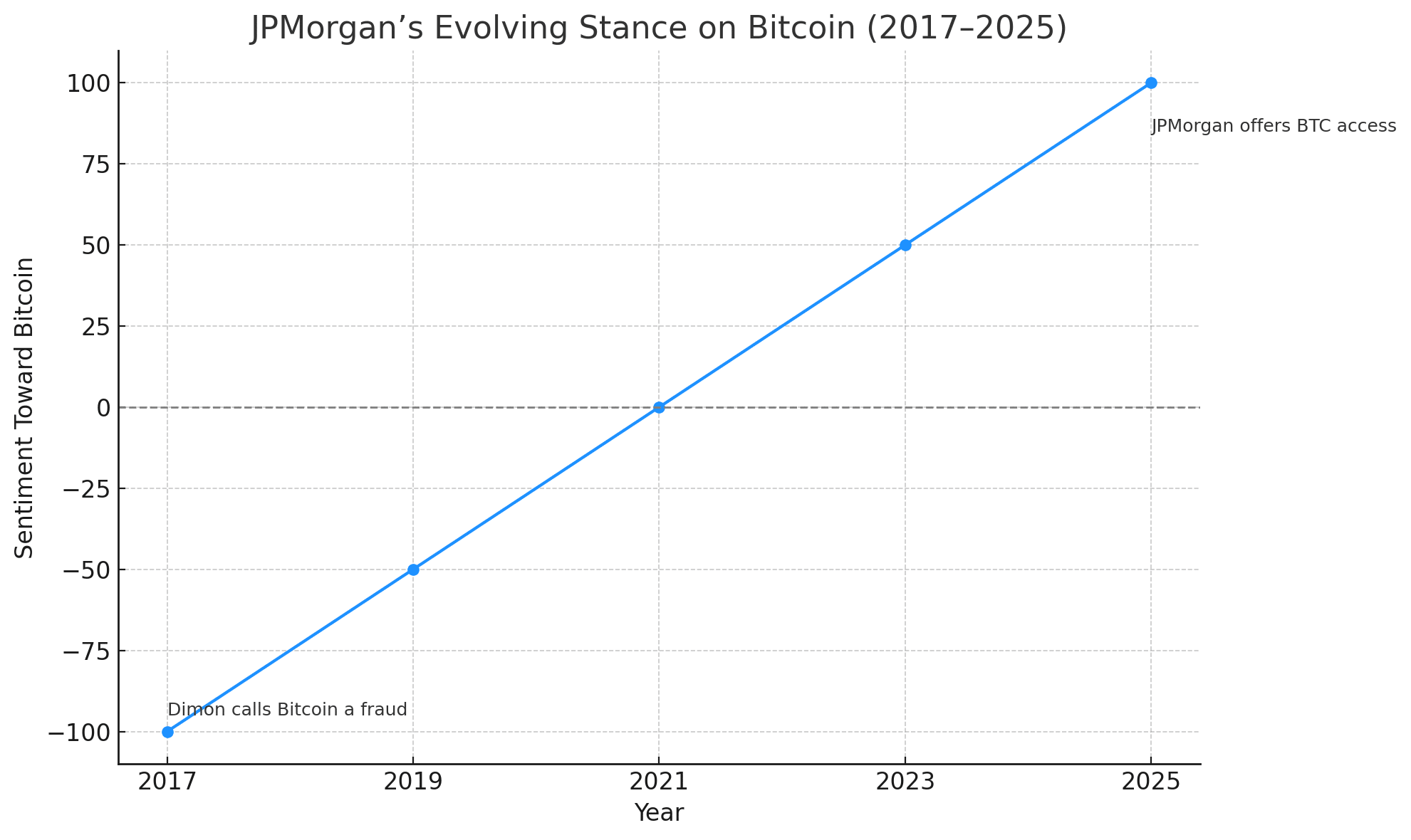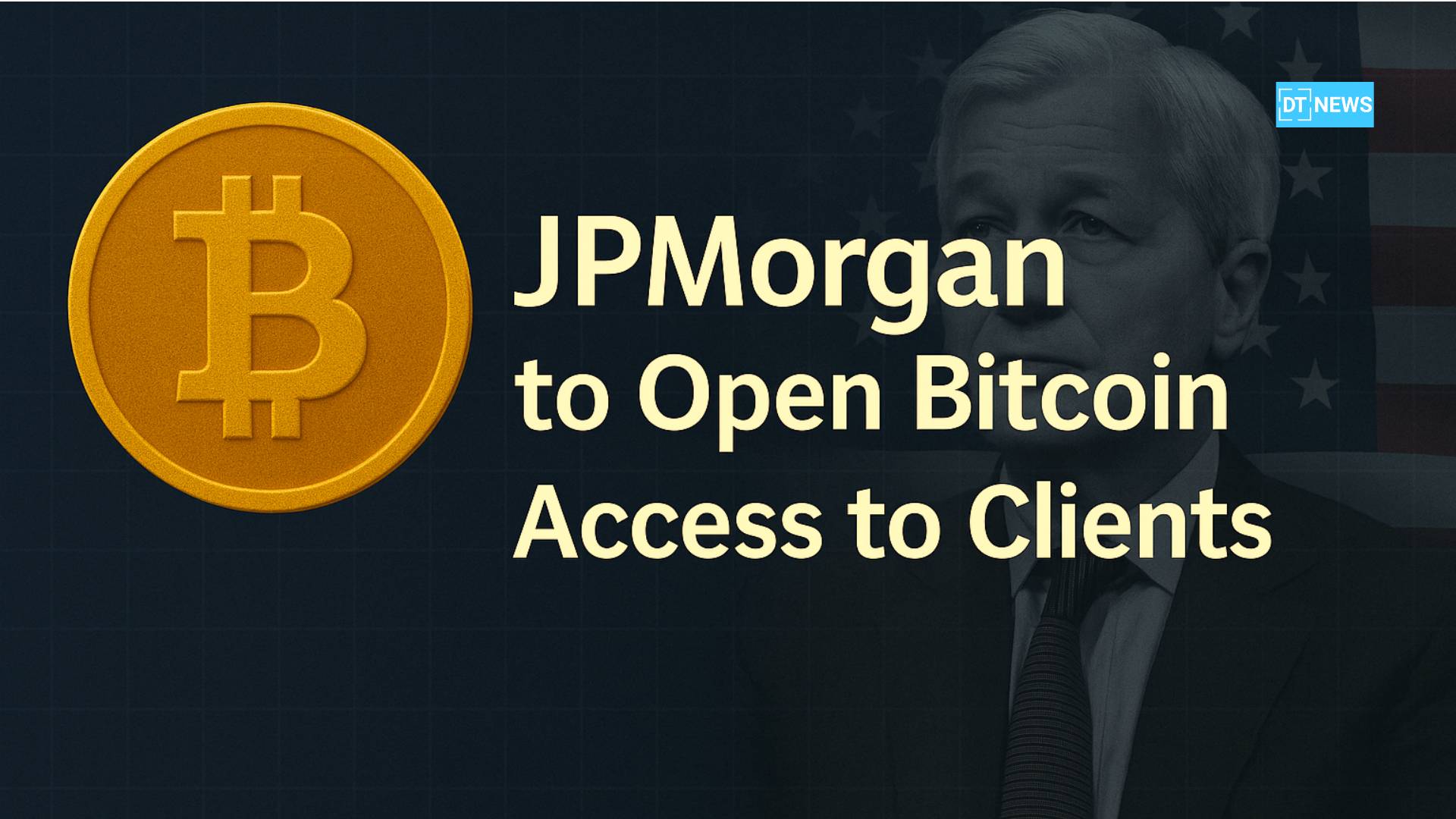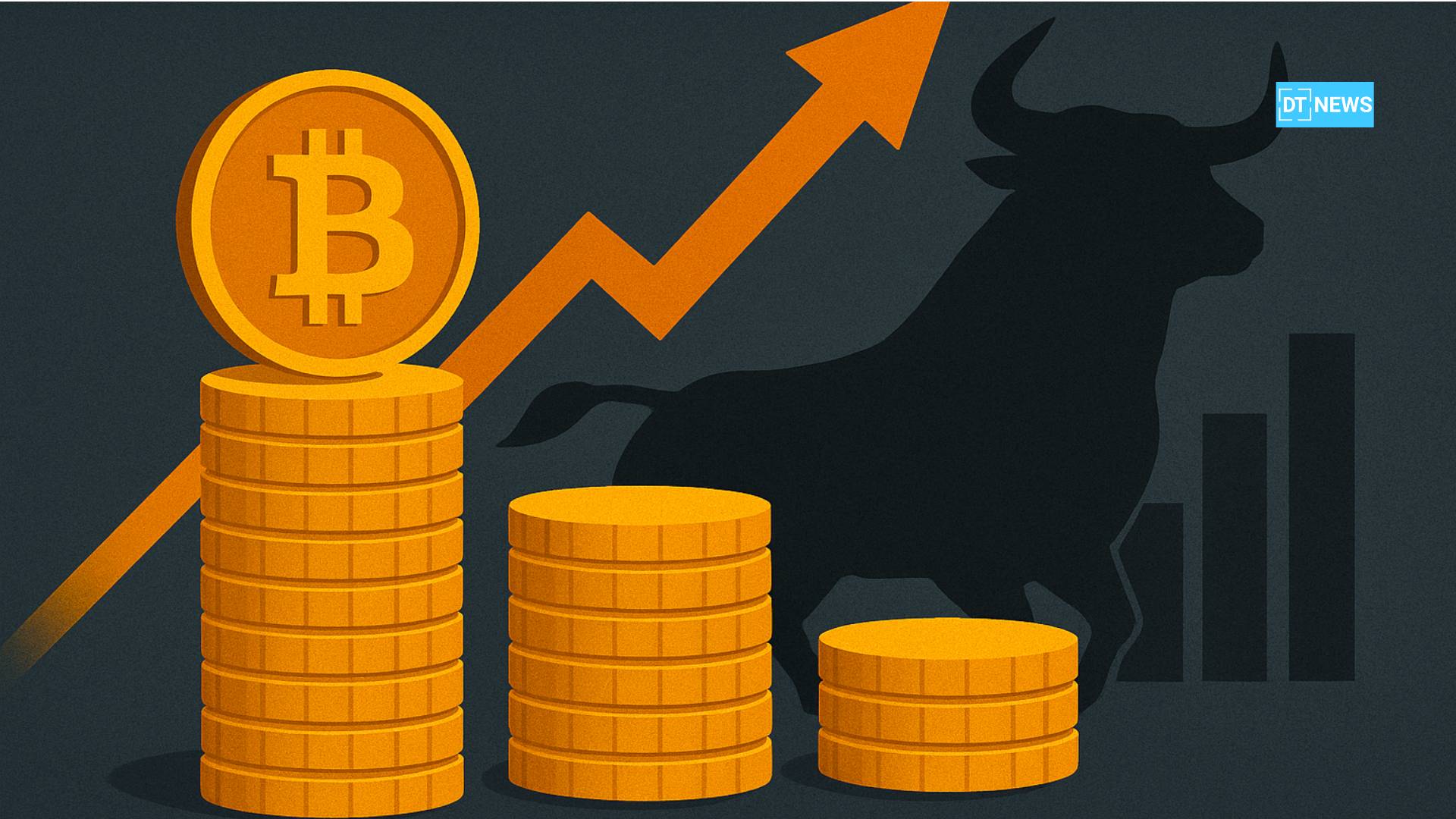JPMorgan Chase CEO Jamie Dimon has confirmed that the bank will allow its clients to invest in Bitcoin (BTC), marking one of the most significant moves yet by a Wall Street giant into the world of digital assets. The announcement signifies a dramatic pivot from Dimon’s long-held skepticism toward cryptocurrencies, and underscores how rapidly Bitcoin is gaining mainstream legitimacy in the eyes of institutional finance.
- From Skepticism to Strategy: Jamie Dimon’s Bitcoin U-Turn
- What JPMorgan’s Bitcoin Offering Entails
- Why Now? The Perfect Storm of Demand and Regulation
- A Boost for Institutional Bitcoin Adoption
- Market Impact and Bitcoin Price
- What’s Next for JPMorgan in Crypto?
- Conclusion: Bitcoin Goes Wall Street
- FAQs
- Glossary
As one of the world’s largest banking institutions, JPMorgan’s decision to open Bitcoin access to clients could be a watershed moment not only for the bank’s high-net-worth investors but also for the wider adoption of Bitcoin across global financial systems.
From Skepticism to Strategy: Jamie Dimon’s Bitcoin U-Turn
Just a few years ago, Jamie Dimon was one of Bitcoin’s most vocal critics, famously calling it a “fraud” in 2017. Fast-forward to 2025, and the narrative has changed dramatically.
In a recent interview with financial media, Dimon admitted that while he still has personal reservations about Bitcoin’s use cases as a currency, “our clients are adults, they want exposure to Bitcoin, and it’s not our job to tell them what they can or can’t invest in.”
This subtle but powerful acknowledgment prioritizes client demand over personal opinion, a major statement from the head of a trillion-dollar financial institution.
What JPMorgan’s Bitcoin Offering Entails
JPMorgan plans to offer Bitcoin access through its private wealth management and institutional client divisions. This will include:
Bitcoin spot trading services
Custody through regulated partners
Advisory products and portfolio integration
Possible integration with ETFs and other Bitcoin-backed instruments
The rollout is expected to begin with accredited investors and, depending on regulatory clearance, gradually expand to include retail segments.

More importantly, JPMorgan is not building this alone. The bank is reportedly working with established crypto custody solutions such as Fidelity Digital Assets and has been exploring custody infrastructure partnerships since early 2024.
Why Now? The Perfect Storm of Demand and Regulation
So why is JPMorgan making this move now?
Surging Client Demand
Wealthy clients and institutional investors have been increasingly requesting Bitcoin access, especially after the success of spot Bitcoin ETFs launched earlier this year in the U.S. According to JPMorgan insiders, inquiries around BTC allocations have surged 3x in the last six months.Regulatory Clarity
With more concrete regulatory frameworks now in place from the SEC and CFTC, traditional institutions finally have a clearer path to offer crypto services. The recent approval of Bitcoin ETFs and updated custodial guidelines have minimized legal ambiguity.Competitor Pressure
Rivals like BlackRock, Fidelity, and Morgan Stanley have already stepped into the Bitcoin space. For JPMorgan to stay competitive in wealth management and asset services, offering Bitcoin exposure has become more of a necessity than an option.
A Boost for Institutional Bitcoin Adoption
JPMorgan’s move sends a strong signal across the financial landscape. When one of the most conservative and risk-aware institutions in global finance embraces Bitcoin access for clients, it de-risks the asset in the eyes of many traditional investors.
“This is the green light institutions have been waiting for,” said Mike Novogratz, CEO of Galaxy Digital. “If JPMorgan’s doing it, every major bank is either already in or about to be.”
Institutional adoption is one of the key catalysts that Bitcoin bulls point to when predicting higher price targets. With JPMorgan’s backing, Bitcoin is no longer just a speculative tool—it’s becoming part of a diversified portfolio strategy for global investors.

Market Impact and Bitcoin Price
Since the news broke, Bitcoin’s price has responded positively, climbing over $105,000 at the time of writing. Analysts suggest this rally could extend if other major banks follow JPMorgan’s lead in the coming weeks.
JPMorgan’s move could also catalyze more regulatory conversations, both domestically and abroad, about how to treat Bitcoin within traditional banking frameworks.
It also helps counter the long-standing narrative that Bitcoin lacks institutional credibility. Now, with heavyweights like BlackRock, Fidelity, and JPMorgan all endorsing Bitcoin exposure, the stage is set for even more widespread acceptance.
What’s Next for JPMorgan in Crypto?
JPMorgan’s entry into Bitcoin services could be just the beginning. The bank is reportedly exploring further blockchain integrations through its Onyx platform, and insiders suggest Ethereum and tokenized assets may be next on the roadmap.
Additionally, the bank has been experimenting with blockchain-based payment rails and smart contracts for cross-border settlements—another indicator that it sees long-term value in blockchain infrastructure beyond just Bitcoin.
“We’re approaching this space with professionalism, compliance, and client-first thinking,” said a JPMorgan spokesperson. “Crypto is here to stay, and we plan to offer best-in-class access.”
Conclusion: Bitcoin Goes Wall Street
Jamie Dimon’s announcement represents more than a policy change, a symbolic milestone for the cryptocurrency industry. The fact that JPMorgan, once a fierce critic, is now enabling clients to buy Bitcoin through its platform speaks volumes about how far digital assets have come.
With demand growing, regulatory clarity improving, and traditional finance finally embracing crypto, JPMorgan’s move is likely just the start of a much larger institutional wave.
FAQs
Q: Can retail clients buy Bitcoin directly through JPMorgan now?
Access will initially be limited to institutional and accredited investors. Based on regulatory updates, retail offerings may follow.
Q: Does Jamie Dimon support Bitcoin personally?
Dimon remains personally skeptical but acknowledges the strong client demand and has decided to respect investor preferences.
Q: What services will JPMorgan offer related to Bitcoin?
Spot trading, custody, advisory services, and integration with ETFs and investment portfolios.
Glossary
Bitcoin (BTC): The first and most widely known cryptocurrency.
Custody: Secure storage of crypto assets, typically handled by licensed firms for institutions.
ETF (Exchange-Traded Fund): A regulated financial instrument that tracks the price of an underlying asset, like Bitcoin.
Accredited Investor: An individual or entity that meets specific financial criteria to access advanced investment products.



















































































































